AMD Zen 3 Ryzen Deep Dive Review: 5950X, 5900X, 5800X and 5600X Tested
by Dr. Ian Cutress on November 5, 2020 9:01 AM ESTCPU Tests: Legacy and Web
In order to gather data to compare with older benchmarks, we are still keeping a number of tests under our ‘legacy’ section. This includes all the former major versions of CineBench (R15, R11.5, R10) as well as x264 HD 3.0 and the first very naïve version of 3DPM v2.1. We won’t be transferring the data over from the old testing into Bench, otherwise it would be populated with 200 CPUs with only one data point, so it will fill up as we test more CPUs like the others.
The other section here is our web tests.
Web Tests: Kraken, Octane, and Speedometer
Benchmarking using web tools is always a bit difficult. Browsers change almost daily, and the way the web is used changes even quicker. While there is some scope for advanced computational based benchmarks, most users care about responsiveness, which requires a strong back-end to work quickly to provide on the front-end. The benchmarks we chose for our web tests are essentially industry standards – at least once upon a time.
It should be noted that for each test, the browser is closed and re-opened a new with a fresh cache. We use a fixed Chromium version for our tests with the update capabilities removed to ensure consistency.
Mozilla Kraken 1.1
Kraken is a 2010 benchmark from Mozilla and does a series of JavaScript tests. These tests are a little more involved than previous tests, looking at artificial intelligence, audio manipulation, image manipulation, json parsing, and cryptographic functions. The benchmark starts with an initial download of data for the audio and imaging, and then runs through 10 times giving a timed result.
We loop through the 10-run test four times (so that’s a total of 40 runs), and average the four end-results. The result is given as time to complete the test, and we’re reaching a slow asymptotic limit with regards the highest IPC processors.
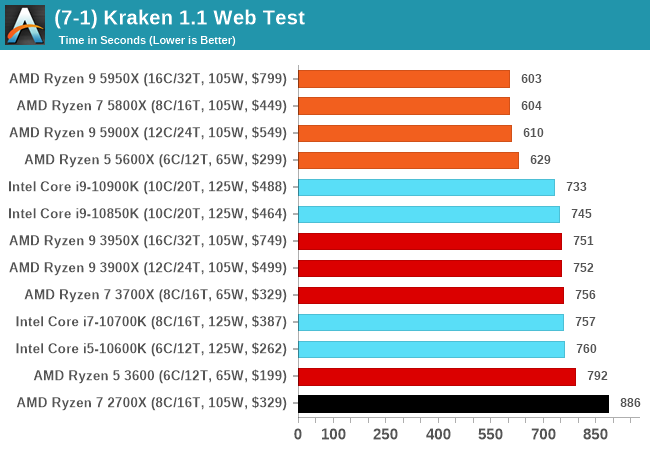
Google Octane 2.0
Our second test is also JavaScript based, but uses a lot more variation of newer JS techniques, such as object-oriented programming, kernel simulation, object creation/destruction, garbage collection, array manipulations, compiler latency and code execution.
Octane was developed after the discontinuation of other tests, with the goal of being more web-like than previous tests. It has been a popular benchmark, making it an obvious target for optimizations in the JavaScript engines. Ultimately it was retired in early 2017 due to this, although it is still widely used as a tool to determine general CPU performance in a number of web tasks.
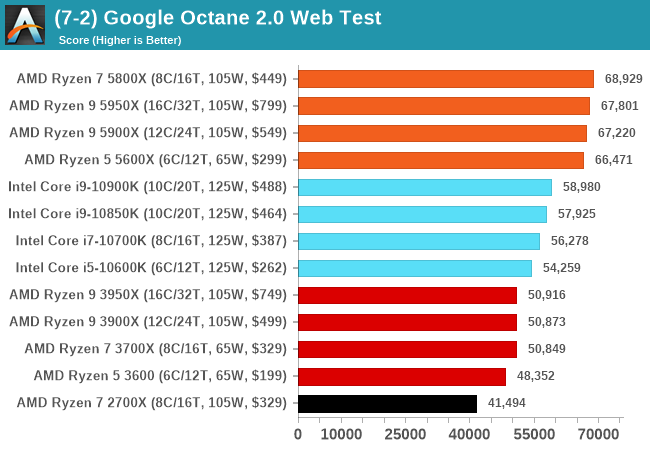
Speedometer 2: JavaScript Frameworks
Our newest web test is Speedometer 2, which is a test over a series of JavaScript frameworks to do three simple things: built a list, enable each item in the list, and remove the list. All the frameworks implement the same visual cues, but obviously apply them from different coding angles.
Our test goes through the list of frameworks, and produces a final score indicative of ‘rpm’, one of the benchmarks internal metrics.
We repeat over the benchmark for a dozen loops, taking the average of the last five.
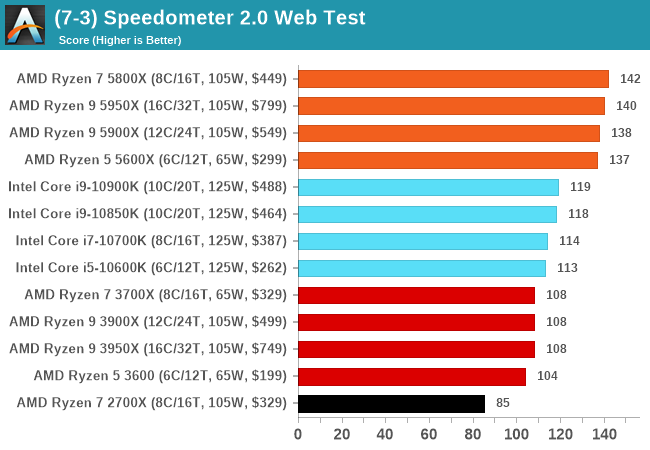
Legacy Tests
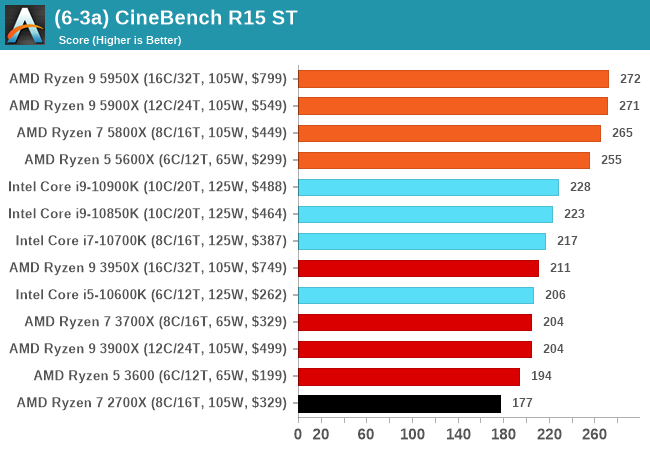
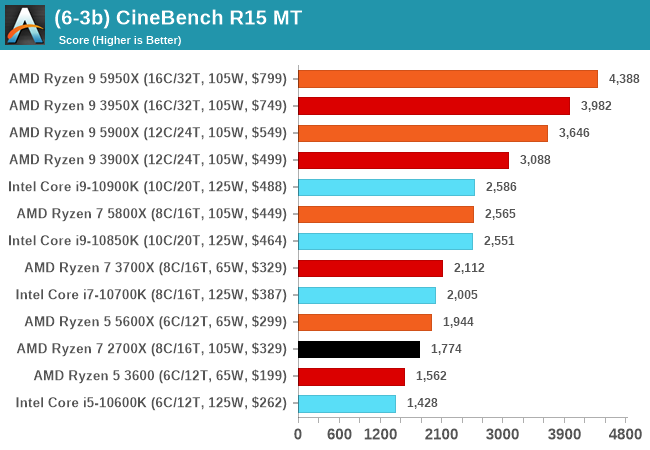
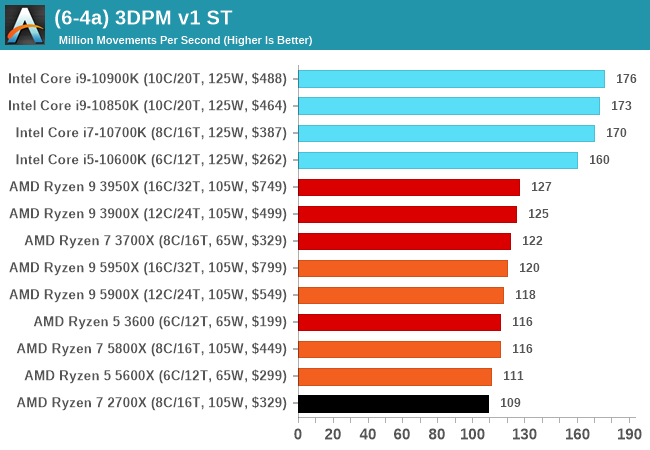
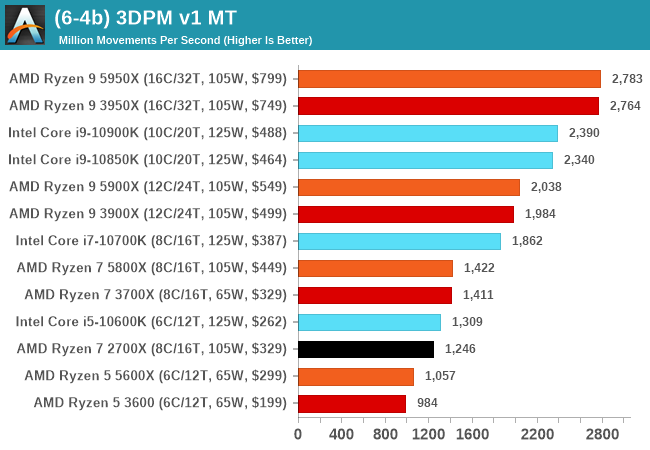


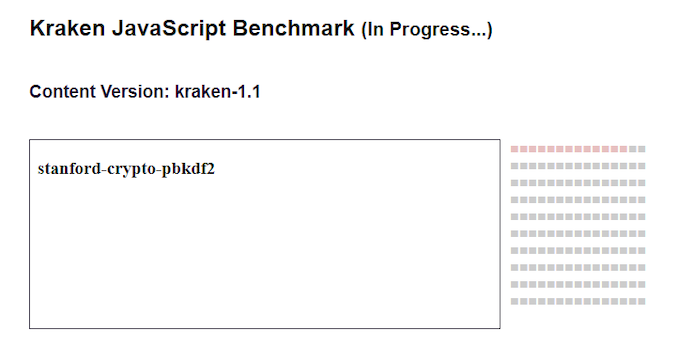
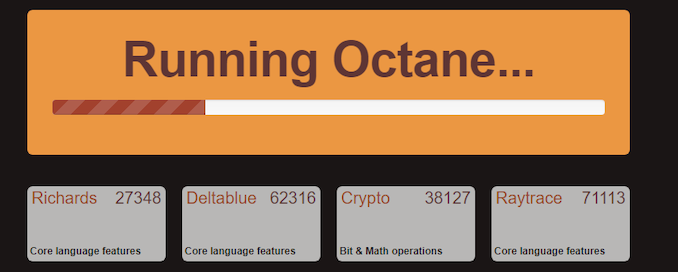
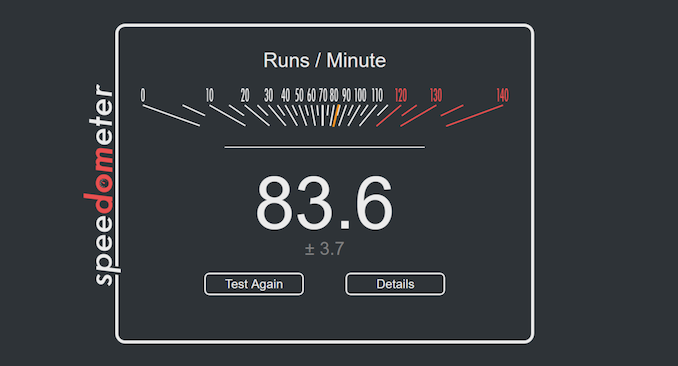








339 Comments
View All Comments
TheinsanegamerN - Tuesday, November 10, 2020 - link
There is no x590 chipset coming. X570 is ryzen 5000s chipset.There's also this miracle fo technology, if you have a micro atx or full atx board, you can put in ADD IN CARDS. Amazing, right? So even if your board does not natively support 2.5G LAN you can add it for a low price, because 2.5G cards are relatively cheap.
TheinsanegamerN - Tuesday, November 10, 2020 - link
the x570 aorus master and msi x570 unify also have 2.5G lan. And surely there will be newer models next year with newer features and names, gotta keep the model churn going!alhopper - Sunday, November 8, 2020 - link
Ian and Andrei - 1,000 Thank Yous for this awesome article and you fine technical journalism. You guys did amazing work and we (the community) are fortunate to be the benefactors.Thanks again and keep up the Good Work (TM).
Rekaputra - Sunday, November 8, 2020 - link
Wow this article it so comprehensive. Glad i always check anandtech for my reference in computing. I wonder how it stack againt threadripper on database or excel compute workload. I know these are desktop proc. But there is possibility use it for mini workstation for office stuff like accounting and development RDBMS as it is cheaper.SkyBill40 - Sunday, November 8, 2020 - link
Once some availability comes back into play... my old and trusty FX 8350 is going to be retired. I've been waiting to rebuild for a long time now and the wait has clearly paid off regardless of how the is the end of the line for AM4 or well Ryzen 4 does next year. I could wait... but nah.jcromano - Friday, November 13, 2020 - link
I'm in a similar boat. I'm still running an i5-2500k from early 2011 (coming up on ten years, yikes), and I'll build a new rig, probably 5600X, when the processors become available. I fret a bit over whether I should wait for the next socket to arrive before taking the plunge, but given the infrequency with which I upgrade, I think it's likely that the next socket would also be obsolete by the time it mattered.evilpaul666 - Sunday, November 8, 2020 - link
I'd love to see some PS3 emulation testing added.abufrejoval - Monday, November 9, 2020 - link
Control flow integrity (or enforcement) seem to be in, and that was for me a major criterion for getting one (5800X scheduled to arrive tomorrow).But what about SEV or per-VM-encryption? From the hints I see this seems enabled in Intel's Tiger Lake and I guess the hardware would be there on all Zen 3 chiplets, but is AMD going to enable it for "consumer" platforms?
With 8 or more cores around, there is plenty of reasons why people would want to run a couple of VMs on pretty much anything, from a notebook to a home entertainment/control system, even a gaming rig. And some of those VMs we'd rather have secure from phishing and trojans, right?
Keeping this an EPIC-only or Pro-only feature would be a real mistake IMHO.
BTW ordered ECC DDR4-3200 to go with it, because this box will run 24x7 and pushes a Xeon E3-1276 v3 into cold backup.
lmcd - Monday, November 9, 2020 - link
Starting to feel like the platform is way too constrained just for the sake of all 6 APUs AMD has released (all with mediocre graphics and most with mediocre CPUs, no less). I hope AMD bifuricates and comes up with an in-between platform that supports ~32-40 CPU PCIe lanes and drops APUs. If APUs can't be on-time with everything else there's so little point.29a - Monday, November 9, 2020 - link
"Firstly, because we need an AI benchmark, and a bad one is still better than not having one at all."Can't say I agree with that.